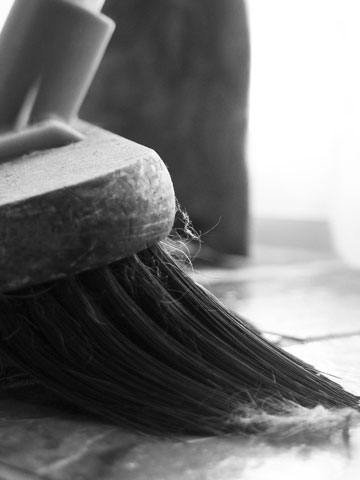Now that Purim has ended the official countdown to Passover has begun folks! This is the time when many Jews begin the step-by-step process of cleaning their house, or apartment (or even office) from top to bottom. Some might take this very seriously by cleaning one room at a time and then closing it off until the first Seder night, while others who have the possibility to go away for the whole week of Passover try to avoid the process entirely. While growing up in New York City in the late ’60s/early ’70s, my parents didn’t really adhere to any particular cleaning ritual. Instead we just tried to finish off whatever bread products we still had in the house by the time the first Seder began, and then allowed only matzah into the kitchen for the duration of the holiday week. But whether it is because I have always been somewhat of a compulsive cleaner, or because I just happen to find some kind of peace in tradition, I have always been fascinated by the ritual of cleaning for this holiday.
As I conducting interviews with Sephardic Jews about their overall memories of Passover while growing up, I was struck by how early their families had begun to prepare for the holiday, and how committed they were to every cleaning detail. Their childhood memories of Passover in the Old Country were vivid and nostalgic, and they appeared to literally light up as they described to me what they and their family did at home. But what was most interesting was that while they didn’t really want to continue the effort it would take to keep up these traditions, they recognized at the same time that something had been lost. They missed the feeling that they once got from the cleaning rituals that made the holiday more special. They also missed knowing that it was something that they shared with others who were doing the same thing in their community. By the time the first night of the Seder arrived, they were more than ready, perhaps as if they had earned it in some way. The Seder itself marked the separation between “old” and “new,” or more significantly, before the Exodus from Egypt and after. In fact the more I spoke to them I realized that the Passover holiday didn’t really begin with the first Seder at all, but rather with the first day of cleaning — the day after Purim — which culminated in the Passover holiday one month later. Without this period of cleaning, organizing, and planning for the Seder, the Passover holiday itself would have been less meaningful to them.
Here is some of what Renée, a Moroccan-born Jew living in Queens, shared with me regarding her memories for the preparations of the holiday:
“My mother used to start koshering the house a month before. We had three bedrooms, so she used to start always with our bedroom, then her bedroom, then the dining room, and the kitchen was the last thing that she used to kosher. A man would come to redo all the mattresses in the house, like the wool that was inside. We used to pay him and I remember the wool, it was like spring cleaning. He would sew them back together with a big needle. It was beautiful, everything was new. The dishes were new, the tablecloth was new — you felt the holiday. The last day, before the holiday, we almost ate outside — almost in the stairs because the bread was out of the house. We used to have a big hallway, and three bedrooms. The toilet was in front, and in back you had the kitchen and three bedrooms, so we were almost at the door or at the stairs by the last day. And every neighbor used to do the same, so you really felt the holiday. The cooking…”


What a beautiful story!